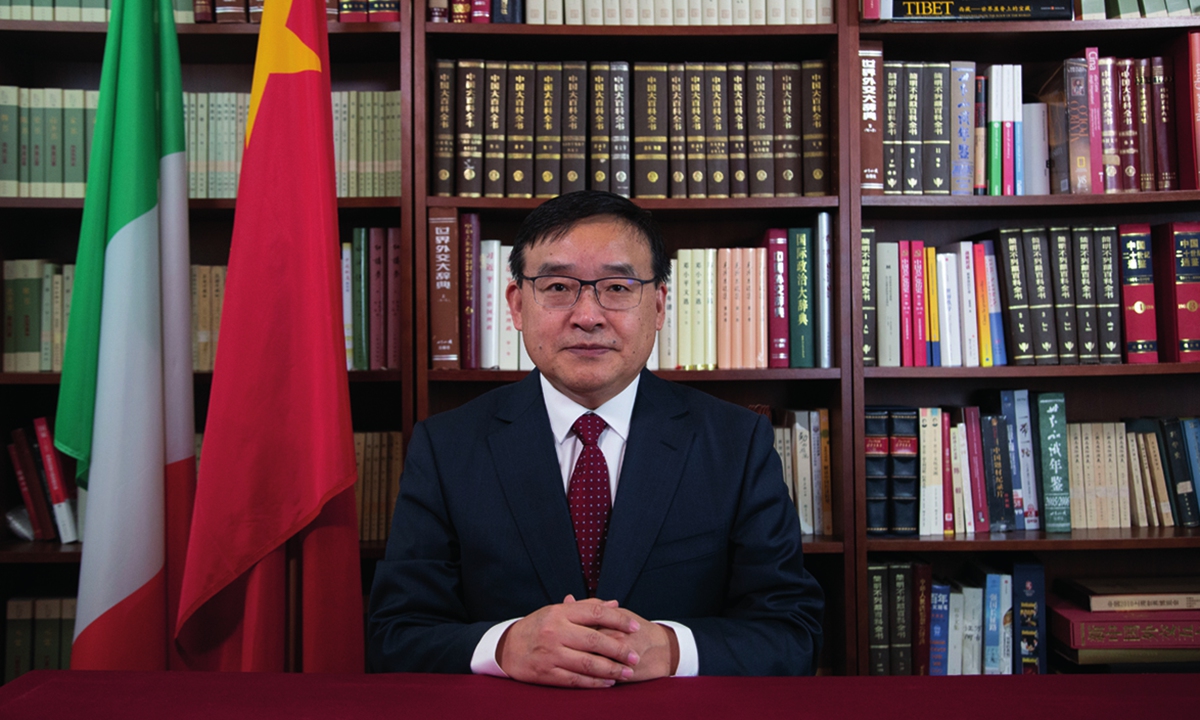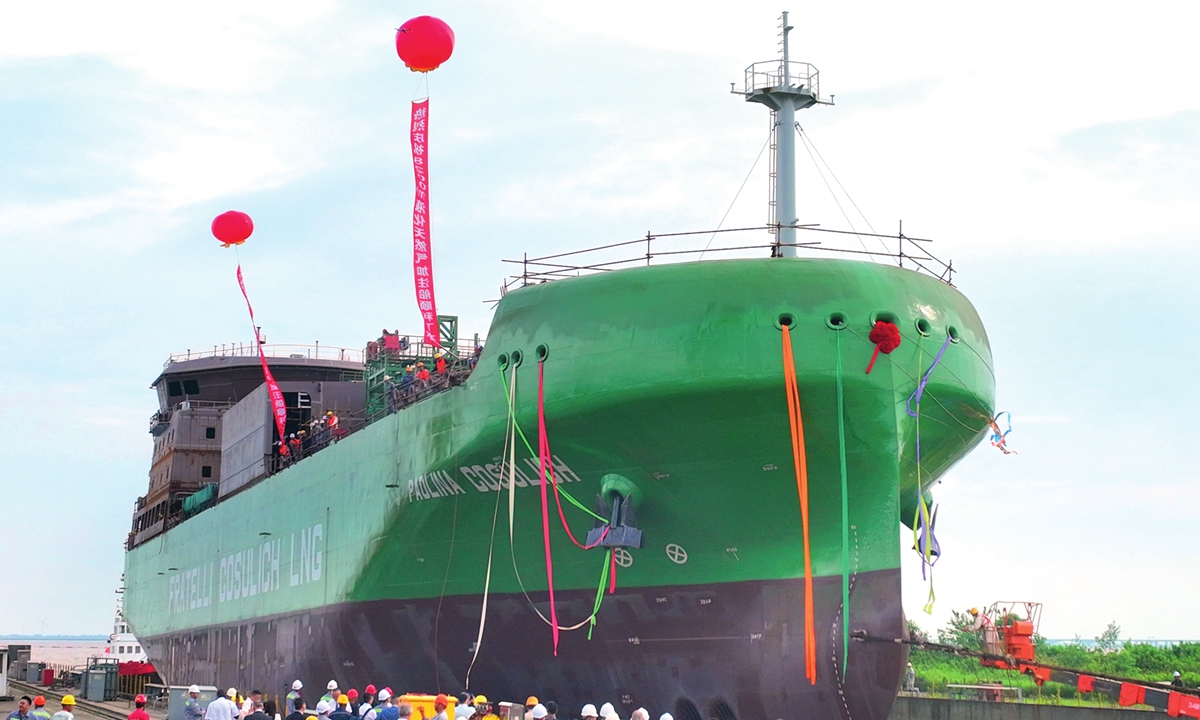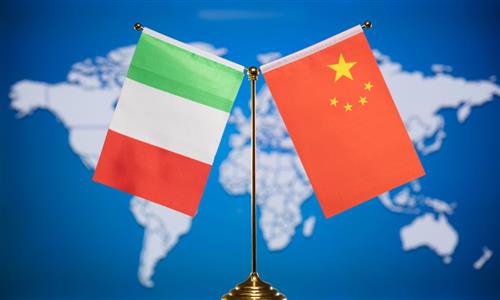China-Italy partnership foresees a brighter future; narrative of the BRI cooperation being 'futile' is baseless, as the facts speak for themselves: Chinese envoy

Chinese Ambassador to Italy Jia Guide Photo: Courtesy of the Chinese Embassy in Italy
Editor's Note:
China and Italy have seen continuous economic and trade development, with bilateral trade volume reaching a new high for three consecutive years. According to a survey by the Italy China Council Foundation, 84 percent of Italian companies hold a positive outlook on the prospects of China-Italy economic and trade relations. The commendable achievements can be attributed to the successful implementation of the Belt and Road Initiative (BRI), which Italy signed with China in 2019. Despite some external voices questioning Italy's involvement in the joint initiative and claiming that it hasn't yielded benefits, the facts speak otherwise. In an exclusive interview with the Global Times (GT), Chinese Ambassador to Italy Jia Guide (Jia) rejected claims of the cooperation being "futile" citing no factual basis. He expressed confidence in the comprehensive strategic partnership, foreseeing a brighter future for China and Italy.
GT: Recently, Yu Jianhua, head of the General Administration of Customs, Liu Jianchao, head of the International Department of the Communist Party of China Central Committee, and Tang Renjian, Minister of Agriculture and Rural Affairs, visited Italy respectively. How do you evaluate the results of this intensive visit at the ministerial level? What is the significance of promoting the stability and development of the current bilateral relations?
Jia: These visits, as you mentioned, are concrete steps taken by the two countries to speed up the implementation of the important consensus reached by the leaders of the two countries in Bali last November. The Italian side warmly welcomed and received the Chinese delegations during their visits, sending a positive signal of Italy's readiness to promote exchanges and practical cooperation. China highly appreciates this.
These visits were of positive significance to promoting the stable development of China-Italy relations.
First, the scope is extensive.
Italian Senate President Ignazio La Russa, Deputy Prime Minister and Minister of Foreign Affairs Antonio Tajani, Minister of Agriculture, Food Sovereignty and Forestry Francesco Lollobrigida, Minister of Health Orazio Schillaci, former Prime Minister of Italy Massimo D'Alema, Secretary of the Italian Democratic Party Elly Schlein, and other dignitaries, as well as representatives of the Italian Parliament, business community and think tanks met and held talks with the Chinese side. These talks brought the two sides closer amid a cordial and friendly atmosphere.
Second, the topics are diverse.
Relevant dialogues include not only macro issues such as bilateral relations and foreign policy, China's major international initiatives, and regional and international hotspot issues, but also specific topics such as fruit export to China, inspection and quarantine of agricultural and food products, customs clearance facilitation, cooperation between directly affiliated customs, registration of food production enterprises in China, sharing of agricultural technology, economic and trade cooperation in agricultural machinery, and exchange of experience in building beautiful countryside. These dialogues fully reflected the willingness of the two sides to strengthen mutual understanding and accommodate each other's concerns.
Third, the outcomes have been fruitful.
The two sides agreed that China and Italy, as strategic partners, should further strengthen exchanges between governments, political parties, legislative bodies, business circles, think tanks, localities, and in people-to-people and cultural fields, and deepen practical cooperation in economy, trade, investment, green transformation, agriculture, and tourism.
At the same time, the two sides will deepen exchanges and mutual learning between civilizations, and promote greater development of China-Italy and China-EU relations.
The two sides also signed the protocol on the export of fresh Italian pears to China and the joint statement on strengthening inter-customs cooperation to ensure supply chain connectivity.
All in all, it is fair to say that these visits have played a positive role in increasing mutual trust and dispelling doubts, promoting practical cooperation, and injecting new impetus into the deepening and solid development of China-Italy comprehensive strategic partnership in the next stage.
GT: China and Italy are important trading partners of each other. In 2022, the trade volume between China and Italy reached $77.884 billion, a year-on-year increase of 5.4 percent, indicating that the economies of the two countries are highly complementary. How do you see this bilateral complementarity? What is your expectation for the development of the bilateral trade this year?
Jia: China-Italy economic and trade relations have been developing continuously over recent years. The bilateral trade volume has hit a new high for three consecutive years. In the first five months of this year, Italy's exports to China increased by 58 percent. The industrial structures of the two countries have distinctive characteristics.
China is the only country that has all the industrial categories in the United Nations industrial classification, and has comprehensive advantages in supporting industries, infrastructure and human resources. Cost-effective consumer goods and electronic products imported from China help curb inflation, while raw materials and industrial semi-finished products contribute a lot for Italian companies to control costs and maintain competitiveness.
Italy has a complete range of export products, and its high value-added industries are highly competitive internationally. Its exports to China mainly include machinery and equipment, automobiles, biomedicine, and high-end clothing. With larger demands arising from China, more Italian high-quality products will enter the Chinese market, which will help to continuously enrich the choices of China's 1.4 billion consumers.
This year, the bilateral trade between China and Italy has become stronger. According to the report of the Italian National Institute of Statistics, the Italian economy performed positively in the first quarter, surpassing other economies in the European Union.
A survey conducted by the Italy China Council Foundation shows that 84 percent of Italian companies view China-Italy economic and trade relations and development prospects in a positive light.
China and Italy are highly complementary in fields such as green economy, ecological construction, technological innovation, and high-end manufacturing, and there is broad space for further cooperation.
I hope the two sides can seize the opportunity, fully utilize various mutually beneficial cooperation mechanisms based on existing collaborations, maintain and strengthen trade cooperation, and explore the potential for cooperation in new industries and new business formats. I have full confidence in this.

An LNG bunkering vessel made by China International Marine Containers (Group) Co for an Italian client is successfully launched at an industrial ship park in East China's Jiangsu Province on June 26, 2023. Photo: VCG
GT: What new opportunities do you believe further opening of the Chinese market will bring to Italian companies? How should Italian businesses seize this opportunity to work together?Jia: China has always been an advocate and promoter of free trade. In the process of promoting Chinese modernization, China will continue to open wider to the outside world, providing better business environment and services.
China has a super-size market, a well-established industrial system, abundant human resources, and a strong foundation for development. Its economic fundamentals have shown a long-term positive trend. China's market access is already at a world-class level, with the number of items on the negative list reducing from 190 to 27. The manufacturing sector is now fully open to foreign investors, with the opening-up of the service sector picking up speed.
China will work to align with high-level international economic and trade rules, steadily expand institutional opening-up, and implement measures such as providing national treatment to foreign firms. These efforts aim to allow companies from various countries, including Italy, to share the dividends of China's high-level institutional opening up.
The upgrade of the Chinese market will, on the one hand, attract more high-quality and premium brands from Italy, enabling sought-after products to reach a broader consumer base.
On the other hand, as the two countries accelerate low-carbon and digital economic transformations, relevant enterprises can fully seize the opportunities and strengthen cooperation in areas such as digital finance, the Internet of Things (IoT), new energy, modern agriculture, and biomedicine. This will allow us to leverage new business opportunities and achieve new developments.
Recently, the World Bank, the International Monetary Fund, and other institutions have raised their expectations for China's economic growth. Chinese Premier Li Qiang's visit to Europe and attendance at the Summer Davos Forum in Tianjin in June have garnered high attention from the international community. The numerous visits from foreign CEOs are also a "vote of confidence" in China's economic opportunities.
Many Italian business and industry figures have recently expressed to me their optimism about China's development potential. They believe that Italy should not and cannot afford to overlook such an important and dynamic market like China.
Many Italian companies are actively participating in major international exhibitions organized by China, which is indeed the right approach from a business perspective. It is hoped and believed that both Chinese and Italian enterprises will continue to uphold the entrepreneurial spirit, play a more significant role in promoting free trade and investment, oppose all forms of protectionism, and make their due contributions to the healthy and stable development of bilateral relations.
GT: Italy was the first among the G7 countries to sign a cooperation agreement with China to jointly build the Belt and Road Initiative (BRI). How do you evaluate the results of the cooperation within the framework? Recently, some external voices have questioned Italy's involvement in the BRI, claiming that Italy has not benefited from it. What is your response to this?
Jia: The MOU on cooperation within the framework of the Belt and Road Initiative between China and Italy is a mutually beneficial and win-win document. After the MOU was signed, the strategic level of China-Italy relations was further enhanced, and Italy's priority position in China's foreign relations and the importance of China-Italy relations in the context of China-Europe relations were significantly elevated. The practical cooperation in various fields has brought tangible benefits and positive effects for both nations and their people.
The bilateral trade volume between China and Italy has hit new highs year after year, and Italy's exports to China have grown rapidly this year.
The first large-scale cruise ship jointly built by the two countries has completed its successful trial voyage. The joint construction project for six cruise ships in total is worth nearly US$5 billion.
STMicroelectronics has signed an agreement with a Chinese company to form a US$3.2-billion semiconductor joint venture.
Italy has been consistently invited to participate in important international exhibitions in China. It was once the guest of honor at the China International Import Expo, and this April, it participated as the only guest of honor at the third China International Consumer Products Expo.
Italy has signed with China a total of nine documents related to the inspection and quarantine of Italian agricultural products, ranking high among European countries.
Italy has become the most popular European destination for Chinese tourists, and Italian paintings and operas have gained immense popularity through various exhibitions and cultural events held in China.
Italian students actively participated in a summer camp program in China, which was the first one held offline since the pandemic broke out, as well as the Shanghai International Youth Interactive Friendship Camp. The number of Chinese students studying in Italy has risen to 29,000, and there are about 6,000 Italian students studying in China.
Thanks to the joint efforts of people from all walks of life in both countries, the practical cooperation and visible achievements within the framework of the BRI continue to increase. The narrative of the BRI cooperation being "futile" is baseless, as the facts speak for themselves.
GT: 2024 will mark the 20th anniversary of the establishment of the China-Italy comprehensive strategic partnership, providing a significant opportunity for further development of the bilateral relationship. What are some of the commendable accomplishments in this cooperation in your view? And what efforts should both sides take in order to better seize the opportunities for development?
Jia: Since the establishment of the comprehensive strategic partnership between China and Italy in 2004, the bilateral relationship has been launched to its best ever period for development. The level of political mutual trust between the two sides has continuously improved, with several visits exchanged between the leaders of both countries, steering the direction of the bilateral relationship. There have been frequent high-level exchanges between the governments, legislatures, and other top-level officials.
The two countries have established important high-level and multi-sector dialogue mechanisms, such as regular meetings between Chinese premiers and Italian prime ministers, dialogues between finance ministers, the China-Italy Government Committee, the Joint Economic Cooperation Committee, China-Italy Science, Technology and Innovation Week, and the mechanism for cultural cooperation, which has comprehensively driven forward bilateral exchanges and practical cooperation in various fields.
The two sides have signed several three-year action plans aimed at strengthening cooperation. The signing of the BRI MOU in 2019 crystalized the long-term mutual respect, trust, and win-win cooperation between the two countries.
Under the guidance and impetus of high-level exchanges and through various mechanism platforms, bilateral trade volume between China and Italy has soared from $11.7 billion in 2003 to nearly $78 billion last year.
Bilateral investment between China and Italy has also experienced rapid growth. The one-billion RMB "Panda Bond" was successfully issued by Italian authorities, the first such issuance by the National Promotional Institute (NPI) confirmed by the European Union.
China's first seismo-electromagnetic satellite, known as Zhangheng 1, with Italian high-energy particle detectors on board, plays an active role in earthquake early warning and disaster prevention and mitigation.
The two countries have achieved a series of visible outcomes in projects related to shipbuilding, offshore wind power, and third-party market cooperation.
Additionally, more high-quality Italian agricultural products have entered the Chinese market. The momentum in bilateral cooperation related to the Winter Olympics, ice and snow industries, and tourism keeps growing.
Moving forward, we should faithfully implement the series of important consensus reached by the leaders of the two countries. On the one hand, continuous efforts should be made to promote high-level political mutual trust, strengthen mutual understanding of and support for each other's core interests and major concerns, step up interactions at the top level and contacts at all levels, fully leverage current dialogue mechanisms, and update and implement cooperation plans in specific fields.
On the other hand, bilateral cooperation and exchanges should be solidly rooted in serving the well-being of the people. We can achieve this by jointly exploring growth opportunities in advanced manufacturing, clean energy, aerospace, and third-party markets, while nurturing the existing sound foundation of cooperation. This will carry forward and strengthen the traditional friendship between the two nations and bring our two peoples closer.
I am confident that the comprehensive strategic partnership between China and Italy has an even brighter future ahead.
GT: Recently, the European Union has initiated discussions on the so-called "de-risking," which has been continuously amplified by certain anti-China politicians. How do you assess this situation? Do the calls for "de-risking" in China-EU relations have any impact on the normal economic and trade cooperation between China and Italy?
Jia: Mutual interdependence is an inevitable outcome of economic globalization. Currently, the global economic recovery is at a critical stage, and maintaining the stability of the global industrial and supply chains is of paramount importance.
Josep Borrell, the High Representative of the European Union for Foreign Affairs and Security Policy, recently stated that China is first and foremost an important partner of the EU, and this positioning is very clear and certain. The EU is willing to maintain a strong engagement with China and strengthen policy synergy between both sides. It is unrealistic and impossible for Europe and China to "decouple" and "de-risking" does not target China in any sense.
In my opinion, this shows that the European side's perception of "de-risking" is, to a certain extent, rational and objective.
China always supports the EU strategic autonomy, and is willing to draw on each other's complementary strengths to realize synergy.
In the spirit of openness and inclusiveness, China and the EU should jointly promote the process of globalization, maintain the free trade system, oppose protectionism, and resist unilateral bullying. Especially, we must be vigilant against politicizing and instrumentalizing economic issues, which will make "de-risking" nothing but a term of choice for "decoupling."
China is committed to establishing new systems for a higher-level open economy, sharing immense market opportunities with the world, and engaging in economic, trade, and investment cooperation with other countries on the basis of mutual respect and mutual benefit.
Recently, companies from countries such as Italy, Germany, and France have expanded their investment in China, covering high-end manufacturing sectors including semiconductors, chemical industries, aircraft, ship-building, and automobiles. This vividly demonstrates that the European business community holds a positive outlook on China's development opportunities and is capable of judging for themselves what the real risks are and where they come from.
With both at a crucial phase of industrial transformation and upgrading, China and Italy, drawing on economic complementary strength, can unleash vast and promising potential for economic and trade cooperation in new fields and new business formats.
We believe that Italy will work together with China to safeguard the momentum of economic, trade and investment cooperation, ensure the stability of industrial and supply chains, and provide a fair, just, and non-discriminatory business environment for the business communities, as this truly serves the interests of the two countries and peoples.



